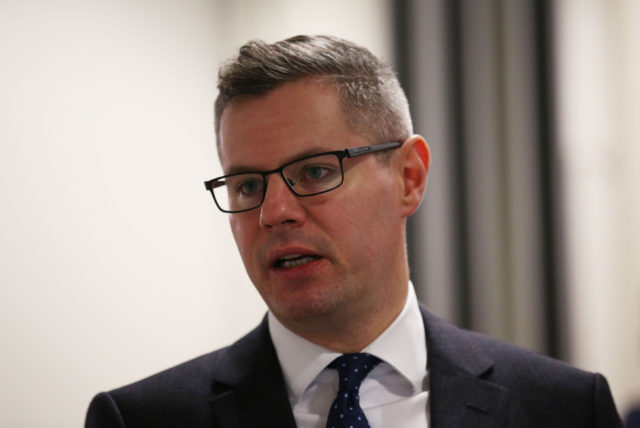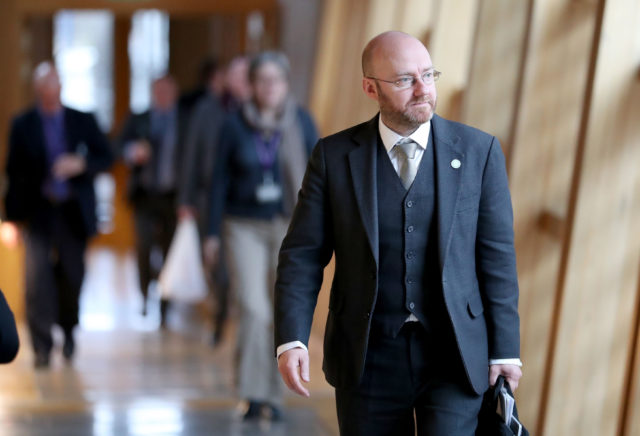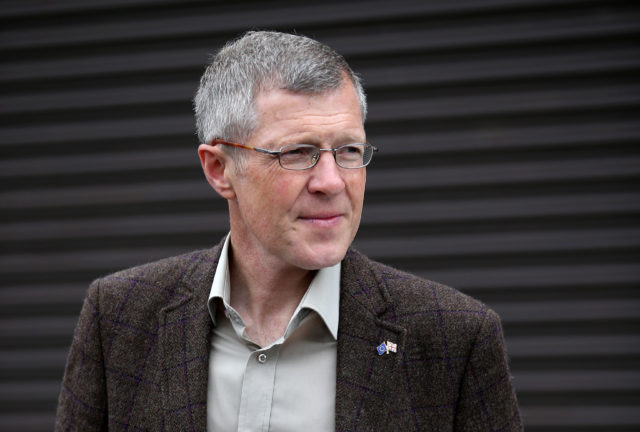
Formal budget talks between Finance Secretary Derek Mackay and the Scottish Greens have not yet taken place – with the smaller party insisting its preconditions for supporting the SNP have not been met.
While Green co-convener Patrick Harvie said he would be “ready to talk” ahead of Wednesday’s Scottish Budget, he stressed the Scottish Government needed to do more on the key issue of local tax reform.
A lack of “meaningful progress” on this has been cited by the Greens – whose six MSPs have supported the minority SNP administration’s budget for the last two years – as the reason why there have been no formal budget talks between the parties.
Mr Mackay is due to unveil his tax and spending plans for 2019-20 in a statement to MSPs at Holyrood on December 12.
 Scottish Finance Secretary Derek Mackay (David Cheksin/PA)
Scottish Finance Secretary Derek Mackay (David Cheksin/PA)
But with the SNP no longer having a majority in the Scottish Parliament, he needs the support of at least one other party if his financial package is to be approved.
Previous finance secretary John Swinney saw his spending plans suffer a shock defeat in 2009, after he failed to win the support of the Greens – although he managed to get his budget passed at the second attempt.
Mr Harvie said by backing the budget for the last two years the Greens had “delivered over £300 million extra for frontline services such as schools and social care”.
But he added: “Given the pressure from a decade-long squeeze on funds and growing demand for services, we need wider reform.
“As MSPs we have been given a clear instruction from our party members that we can only enter formal budget negotiations if there is meaningful progress on local tax reform to make a fairer system that protects services and cuts inequality.
“Replacing Council Tax with a fairer alternative can’t happen overnight, but the work must begin now. Three years ago this week the SNP agreed with the Greens, Labour and the Lib Dems that ‘the present system of Council Tax must end’.
“If they are unwilling to recommit to that policy and start working on making that pledge a reality, then they will be choosing to close off any chance of reaching a budget agreement with the Greens.”
 Scottish Green co-convener Patrick Harvie (Jane Barlow/PA)
Scottish Green co-convener Patrick Harvie (Jane Barlow/PA)
Mr Harvie said: “If the Government is ready to change its position, we’ll still be ready to talk. But in the absence of that, budget negotiations would be a breach of trust with the democratic decision of our party, and therefore they cannot yet take place.”
He spoke as Scottish Liberal Democrat leader Willie Rennie announced his party had pulled out of Budget talks with the Government, citing the the SNP’s insistence that “their damaging and costly plan for an independence referendum had to stay on the table” as the reason.
Areas of common interest were discussed over two meetings between the Government and the Lib Dems, Mr Rennie said, with his party wanting more cash for mental health services, local councils and teachers’ pay.
The Lib Dem said it was “disappointing” that the SNP administration had been unable to “set aside their independence plans”.
Mr Rennie said: “I met with Derek Mackay and Kate Forbes on two occasions to explore what could be done but the talks ended when they could not agree to even a short cessation in their independence campaign.
“This means the Scottish Government are stuck with the Greens and are at their mercy.”
 Scottish Liberal Democrat leader Willie Rennie (Jane Barlow/PA)
Scottish Liberal Democrat leader Willie Rennie (Jane Barlow/PA)
Labour wants the Budget to include a rail fares freeze for ScotRail travellers and a £5 a week rise in child benefit, which it said would lift 30,000 youngsters out of poverty.
The Tories want the SNP to commit to no new tax rises in 2019-20, after Mr Mackay made a number of changes to income tax in Scotland this year, leaving some higher earners paying more than their counterparts south of the border.
Conservative finance spokesman Murdo Fraser said: “The SNP must give taxpayers a fair deal on taxation, invest in public services and no new tax rises.”
But SNP MSP Angela Constance said: “If the Tories want to promise high earners a handout, they have to explain what public service they’d cut to fund it – otherwise nobody will take them seriously.
“People know that public services need investment, and think it’s fair that higher earners pay their fair share to fund our schools and hospitals.”



Why are you making commenting on The Herald only available to subscribers?
It should have been a safe space for informed debate, somewhere for readers to discuss issues around the biggest stories of the day, but all too often the below the line comments on most websites have become bogged down by off-topic discussions and abuse.
heraldscotland.com is tackling this problem by allowing only subscribers to comment.
We are doing this to improve the experience for our loyal readers and we believe it will reduce the ability of trolls and troublemakers, who occasionally find their way onto our site, to abuse our journalists and readers. We also hope it will help the comments section fulfil its promise as a part of Scotland's conversation with itself.
We are lucky at The Herald. We are read by an informed, educated readership who can add their knowledge and insights to our stories.
That is invaluable.
We are making the subscriber-only change to support our valued readers, who tell us they don't want the site cluttered up with irrelevant comments, untruths and abuse.
In the past, the journalist’s job was to collect and distribute information to the audience. Technology means that readers can shape a discussion. We look forward to hearing from you on heraldscotland.com
Comments & Moderation
Readers’ comments: You are personally liable for the content of any comments you upload to this website, so please act responsibly. We do not pre-moderate or monitor readers’ comments appearing on our websites, but we do post-moderate in response to complaints we receive or otherwise when a potential problem comes to our attention. You can make a complaint by using the ‘report this post’ link . We may then apply our discretion under the user terms to amend or delete comments.
Post moderation is undertaken full-time 9am-6pm on weekdays, and on a part-time basis outwith those hours.
Read the rules hereLast Updated:
Report this comment Cancel